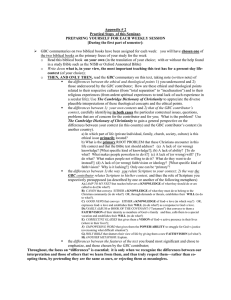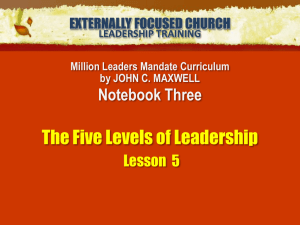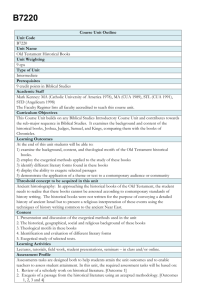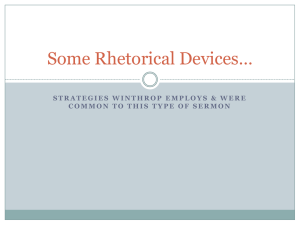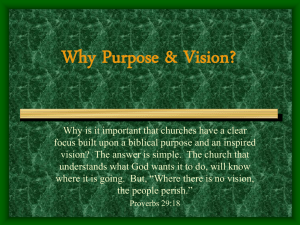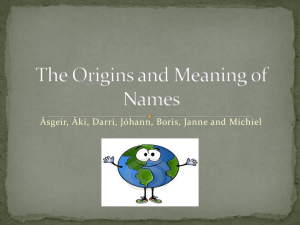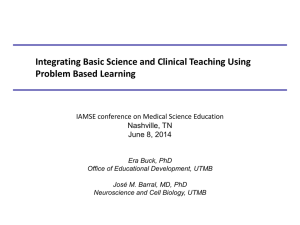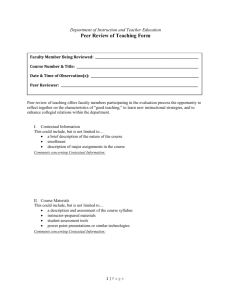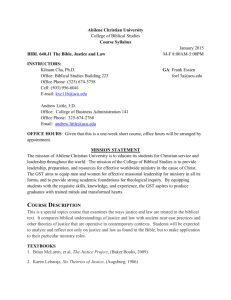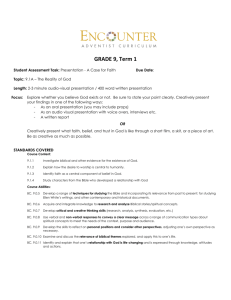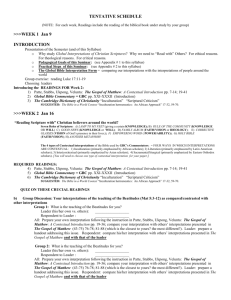RLST 206 AND DIV/REL 3845
advertisement
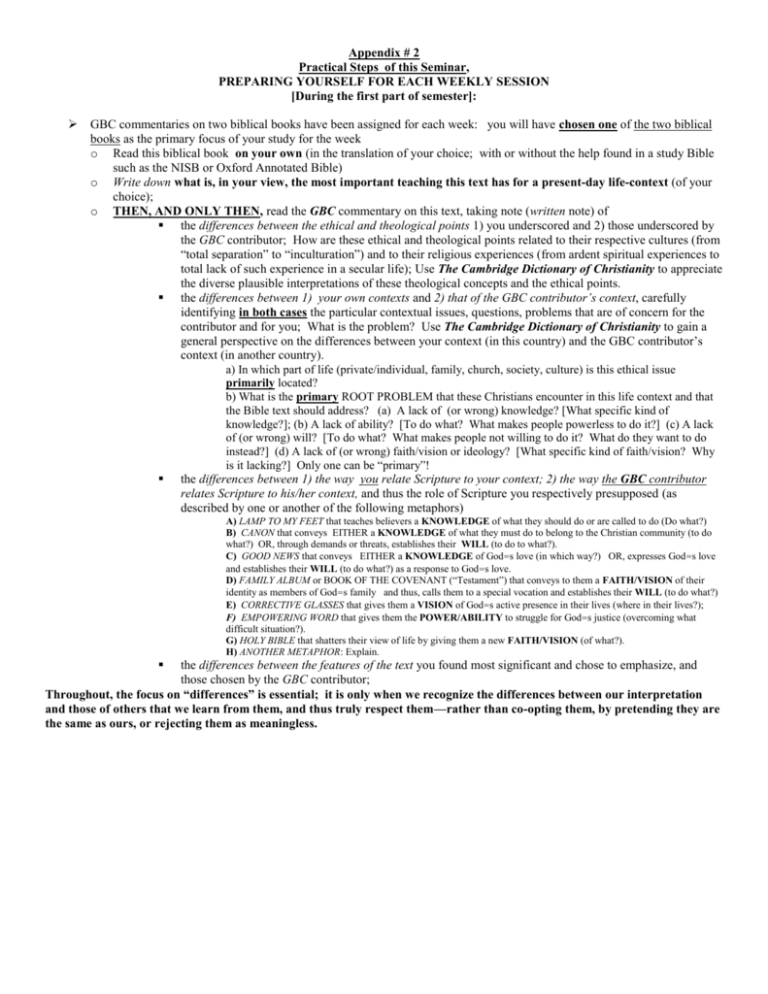
Appendix # 2 Practical Steps of this Seminar, PREPARING YOURSELF FOR EACH WEEKLY SESSION [During the first part of semester]: GBC commentaries on two biblical books have been assigned for each week: you will have chosen one of the two biblical books as the primary focus of your study for the week o Read this biblical book on your own (in the translation of your choice; with or without the help found in a study Bible such as the NISB or Oxford Annotated Bible) o Write down what is, in your view, the most important teaching this text has for a present-day life-context (of your choice); o THEN, AND ONLY THEN, read the GBC commentary on this text, taking note (written note) of the differences between the ethical and theological points 1) you underscored and 2) those underscored by the GBC contributor; How are these ethical and theological points related to their respective cultures (from “total separation” to “inculturation”) and to their religious experiences (from ardent spiritual experiences to total lack of such experience in a secular life); Use The Cambridge Dictionary of Christianity to appreciate the diverse plausible interpretations of these theological concepts and the ethical points. the differences between 1) your own contexts and 2) that of the GBC contributor’s context, carefully identifying in both cases the particular contextual issues, questions, problems that are of concern for the contributor and for you; What is the problem? Use The Cambridge Dictionary of Christianity to gain a general perspective on the differences between your context (in this country) and the GBC contributor’s context (in another country). a) In which part of life (private/individual, family, church, society, culture) is this ethical issue primarily located? b) What is the primary ROOT PROBLEM that these Christians encounter in this life context and that the Bible text should address? (a) A lack of (or wrong) knowledge? [What specific kind of knowledge?]; (b) A lack of ability? [To do what? What makes people powerless to do it?] (c) A lack of (or wrong) will? [To do what? What makes people not willing to do it? What do they want to do instead?] (d) A lack of (or wrong) faith/vision or ideology? [What specific kind of faith/vision? Why is it lacking?] Only one can be “primary”! the differences between 1) the way you relate Scripture to your context; 2) the way the GBC contributor relates Scripture to his/her context, and thus the role of Scripture you respectively presupposed (as described by one or another of the following metaphors) A) LAMP TO MY FEET that teaches believers a KNOWLEDGE of what they should do or are called to do (Do what?) B) CANON that conveys EITHER a KNOWLEDGE of what they must do to belong to the Christian community (to do what?) OR, through demands or threats, establishes their WILL (to do to what?). C) GOOD NEWS that conveys EITHER a KNOWLEDGE of God=s love (in which way?) OR, expresses God=s love and establishes their WILL (to do what?) as a response to God=s love. D) FAMILY ALBUM or BOOK OF THE COVENANT (“Testament”) that conveys to them a FAITH/VISION of their identity as members of God=s family and thus, calls them to a special vocation and establishes their WILL (to do what?) E) CORRECTIVE GLASSES that gives them a VISION of God=s active presence in their lives (where in their lives?); F) EMPOWERING WORD that gives them the POWER/ABILITY to struggle for God=s justice (overcoming what difficult situation?). G) HOLY BIBLE that shatters their view of life by giving them a new FAITH/VISION (of what?). H) ANOTHER METAPHOR: Explain. the differences between the features of the text you found most significant and chose to emphasize, and those chosen by the GBC contributor; Throughout, the focus on “differences” is essential; it is only when we recognize the differences between our interpretation and those of others that we learn from them, and thus truly respect them—rather than co-opting them, by pretending they are the same as ours, or rejecting them as meaningless. -2GROUP DISCUSSION During the Group Discussion, one member of the group— Presenter of GBC -- will analyze and present the main characteristics (contextual, theological, textual characteristics) of the GBC interpretation of a text; another member of the group – the Discussion Leader – will present the contextual, theological, textual differences between his/her own contextual interpretation and that of the GBC. The Respondent to the Leader will present a critical assessment of the leader’s handout: Contextual choices: Does the leader’s view of the problem and root-problem in his/her chosen context make sense? Or would an alternate view be better or be more realistic? Hermeneutical/theological choices: Is the leader’s view of the role of scripture consistent with his/her assessment of the problem? What view of the role of scripture would be necessary if one has an alternate view of the problem? What theological or ethical issue or concept is central, and how is it defined? What are other possibilities? Analytical/Textual choices: What are the passages of the biblical book that the leader has chosen as most significant? Are there other passages which could have been even more significant with other contextual and theological choices? DURING THE SECOND PART OF THE SEMESTER The group discussions will be focused on biblical texts you will have chosen as topics for your papers; in several stages, you will prepare your own contextual commentary of this biblical text, formulating its teaching for a particular aspect of your own life-context following one of the patterns found in the GBC. -3Appendix # 3 TAKE HOME MID-TERM = PAPER PROPOSAL DUE MONDAY FEB 27 in class By MONDAY February 20 10 AM You should have proposed your top three choices of a Biblical text [ranked in order of preference] among the biblical books which are NOT discussed during the first half of the semester. (You will know by February 21 at 3PM which of your three choices has been assigned to you.). 3-4 pages Take-Home Mid-Term paper proposal = 10% of Final Grade – INTRODUCTION: Specify from which concrete life-context you propose to read the chosen book- -explaining what is/are the major problem[s] in this context (nature of the problems/aspect of life it concerns, and root-problem), which, you hope, the teaching of this biblical book will be able to address As you will do in a more detailed fashion the first part of the paper: -PART I- YOUR LIFE CONTEXT AND THE TEXT) explain: A) Which one of the four contextual ways of interpreting will you use? 1) in a cultural/way of life context (Inculturation)? 2) in a social, economic, or political context where people are oppressed or deprived (Liberation)? 3) in a literary/communication [media] cultural context with its texts and other cultural artifacts, and media (Inter(con)textual)? 4) in a religious context with its religious experiences and rituals (Sacramental/liturgical)? Why not the others? You need to show an in-depth understanding of the difference between these contextual ways. Review your notes on the lectures and class discussion. B) Which one of the 5 strategies for becoming self-conscious about the contextual character of your biblical interpretation will you emphasize? 1) Paying attention to the ways in which they “affect certain groups of people” (e.g., an aspect of feminist interpretations)? 2) Studying the history of reception of biblical texts? 3) “Reading with ordinary readers”? 4) “Breaking biblical texts” (using traditional ways of reading, particular to each culture)? 5) “Producing alternate contextual interpretations” (challenging existing interpretation)? Why not the others? You need to show an in-depth understanding of these strategies, by explaining how you will actually implement one of these in your paper, and what are the resources you need to do so. Review your notes on the lectures. C) Which one of the traditional interpretations of Scripture your interpretation is the closest to yours? Why not the others? You need to show an in-depth understanding of these traditional interpretations of Scripture D) Preliminary Analysis of your Text: an Overall Presentation of the Biblical Book, so as to identify and locate in it the specific passages and textual features that will be discussed in detail. (Use scholarly sources) TOPIC OF YOUR PAPER PAPER DUE Saturday, April 28 at 3:00pm Prepare a “contextual interpretation” (a contextual commentary) of a book of the Bible of your choice (the body of your paper). Compare it with the interpretation found in the GBC, emphasize the differences so as to further show what is most distinctive in your interpretation and how thoroughly it is inculturated and contextualized. Prepare your 15-18 double-spaced page paper in 3 parts, after CHOOSING A BIBLICAL BOOK (in consultation with the instructor: you must have chosen a biblical book by Monday FEBRUARY 20 10 AM.) -PART I- YOUR LIFE CONTEXT , THE GBC LIFE CONTEXT, AND THE TEXT (30%) a) Introduction: Identifying the Life-Context in which the Biblical Book Is Interpreted. Your concrete presentation of the context from which you write. This sketch underscores those features of your situation which are related to the "contextual questions" that will be raised (see below, b). These features will be geographical, and also religious, cultural, political, economic, and/or social. This is either a "I" discourse, but more likely a "we, in this context" discourse. How does your life-context compare with (differ from) the life context of the GBC commentary on the same book? b) Analyzing the Life Context, its Problems and the Theological Issues it Raises Regarding the Relationship between the People of God and World. The Contextual and Theological Questions that focus 1) your reading of the biblical book and 2) the GBC reading of the book. This involves identifying in each case how “the people of God” is defined and how “the world” is defined, then to proceed to a twoway preliminary analysis of this present-day context in terms of the text and of the text in terms of the present-day context. This involves in each case: 1) pointing out those specific problems and issues regarding the relationship between the people of God and the world in that context which is highlighted by the text; and 2) identifying the specific passages of the text which are most significant in view of the context and the issues it raises. 1) Considering this life-context from the perspective of the given biblical book as corrective lenses, one can ask: What are the problems or needs concerning the relationship between the people of God and the world that the People of God should address in this situation for the sake of the world? For the sake of the people of God and its members? For instance: Are these needs related to the religious make up of the society, and concerns the relationship of the people of God to other religions or to a non-religious, secular majority? Are these cultural needs concerning the world view and the life-style of -4people in that context? Educational needs? Social needs concerning justice in this society and its structures of power and authority? Economic needs (regarding poverty, economic oppression, lack of healthcare)? Political needs calling for the confrontation of a corrupt political power? 2) Conversely, considering the given biblical book from the perspective of this life-context you also need to ask: What does this biblical book say regarding the relationship of the People of God to the world in this specific context in which the commentator is? Does it concern a mission of the People of God toward the world (toward individuals and communities beyond its borders)? If so, what kind of mission? Or, alternately, does it concern the active place and role of the People of God in society and culture (from which it may not really be regarded as separated)? Does the biblical book address the relationship of the people of God with political, economic, and social institutions and authorities? What does it say or imply about interactions with other religions? What are the other concrete or theological issues concerning the People of God in its relationship to the world? Most biblical books will contain material addressing many of these issues. You must therefore choose one (or a very few) of these issues, because it is particularly important in your present context. Is this an issue: Concerning the relationship between Christian and cultural identity (best addressed with an inculturation approach)? Concerning social and justice problems (best addressed with a liberation approach)? Concerning the relationship between Christians and other religions or groups (best addressed with an inter(con)textual approach)? Concerning the sanctification/sacralization of the world (best addressed through a sacramental/liturgical/religious experience approach). (See the contextual ways of interpreting.) -PART II- YOUR CONTEXTUAL COMMENTARY 5% a) Analysis of the Text I: an Overall Presentation of the Biblical Book, so as to locate in it the passages and textual features that will be discussed in detail. (Use scholarly sources) [[prepared as part of your proposal; might be revised] 40% b) Analysis of the Text II: Commentary upon the passages that addresses the contextual issues). (Use scholarly sources!) It includes 1) an analysis of each passage (highlighting its most significant features, with the help of one or another critical approach: historical (showing the contextual character of the biblical book), narrative, structural, literary (in the text) or “in front of the text” (how the text affects its readers); and 2) comments on the way it addresses or fails to address the issues concerning the relationship between people of God and the world which were outlined above. -PART III- 20% YOUR COMMENTARY AND GBC Differences with the GBC Interpretation: a) What textual features did it emphasize that you did not emphasize or even consider? What textual features did you emphasize that it did not emphasize or even consider? b) What are the key theological or ethical concepts (or themes) that you emphasized and that the GBC emphasized? Which one of the 5 strategies for becoming selfconscious about the contextual character of your biblical interpretation (i.e., of your particular textual choices and particular theological/hermeneutical choices) did you use? (Note: this often involves comparing with a few additional interpretations). SHORT BIBLIOGRAPHY for the biblical book and the contextual issues discussed. PAPER DUE Saturday, April 28 at 3:00pm
